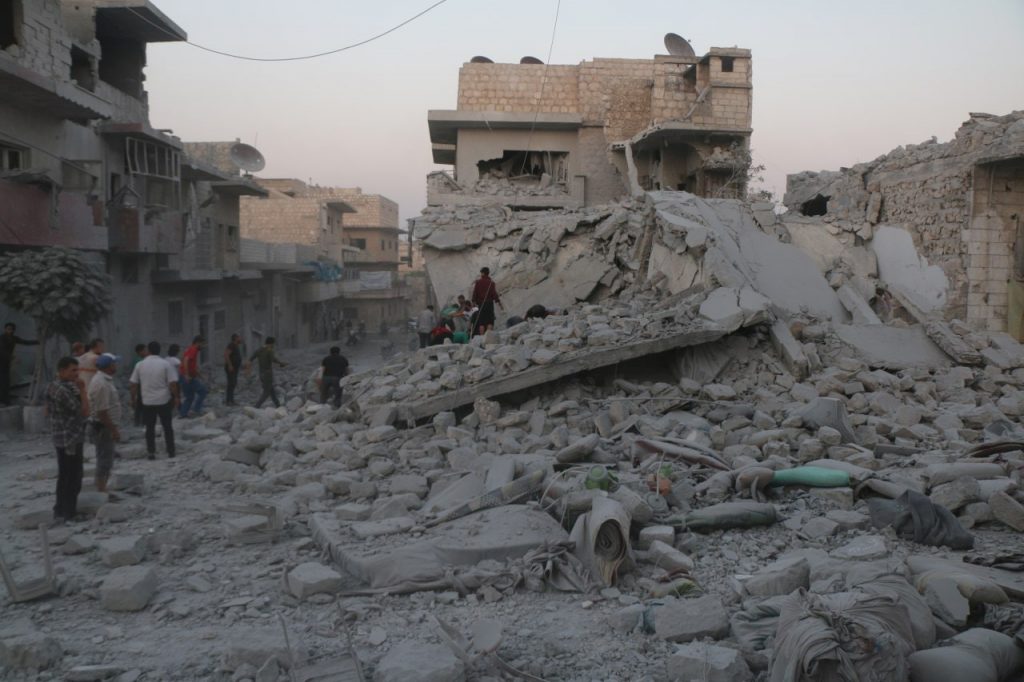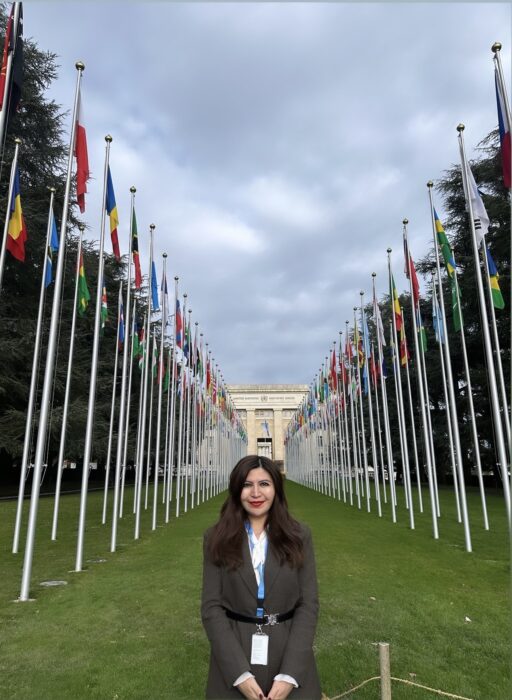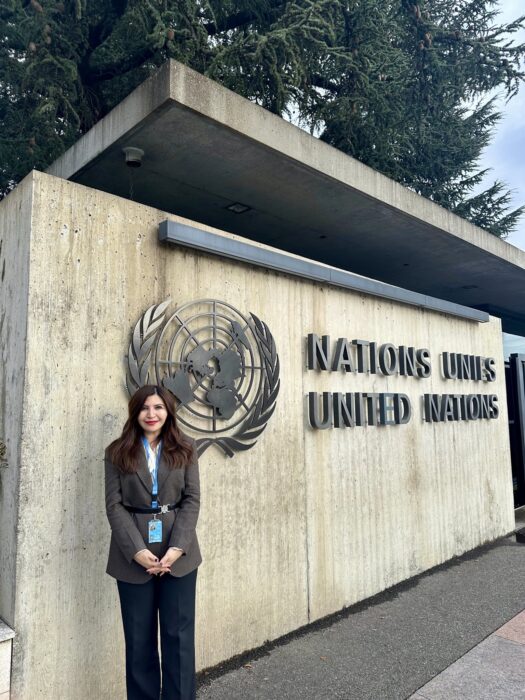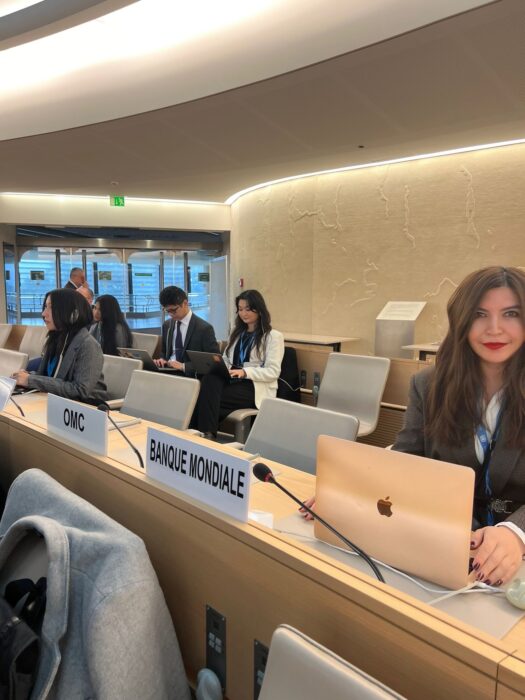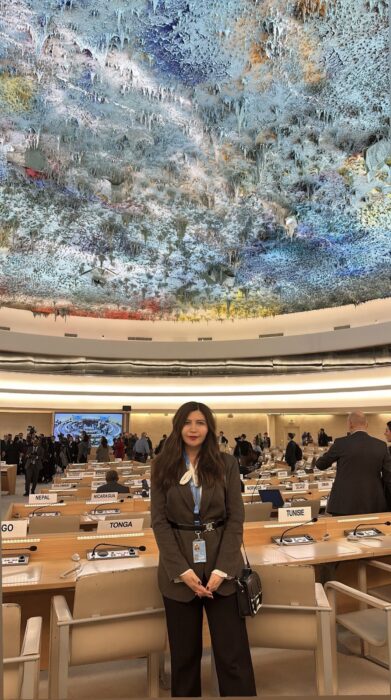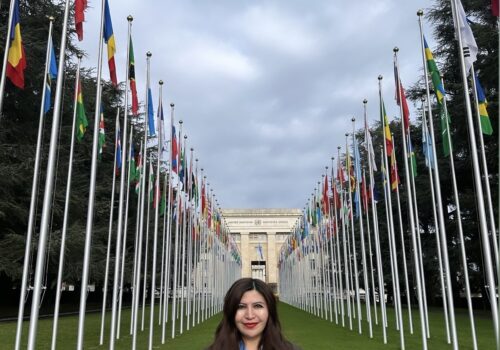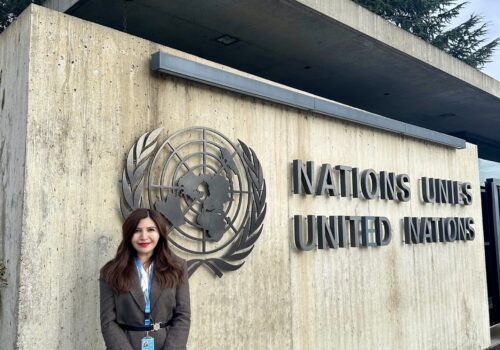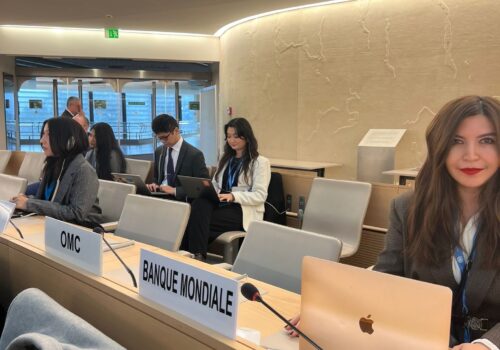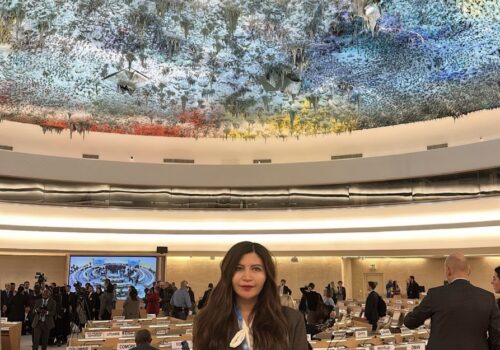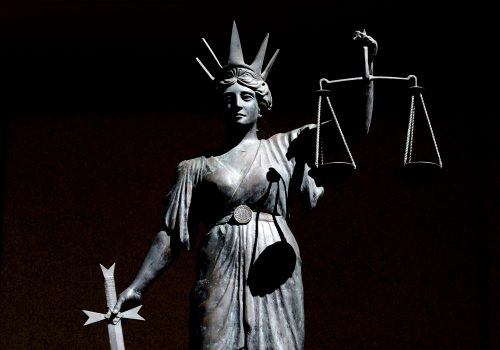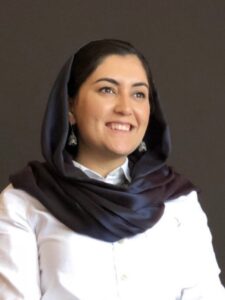The Strategic Litigation Project works to inject fresh thinking into how governments and practitioners can use legal tools to advance human rights and accountability. To that end, we aim to implement projects addressing accountability gaps across various contexts.
One such project is our effort to establish an intergovernmental Syria Victims Fund. Over the past year, we and our Syrian partners have conducted dozens of consultations with Syrian civil society to develop a framework for the fund, which were used to draft a white paper on the concept for decision makers in country capitals and within international organizations. In February, we were thrilled to see the framework implemented into the European Parliament’s report recommending that the European Council, European Commission, and European External Action Service work to establish such a fund.
We have also seen promising progress in the ongoing campaign to codify the crime of gender apartheid in the United Nations (UN) Sixth Committee’s draft crimes against humanity treaty. On March 8, International Women’s Day, we cohosted a high-level panel event in New York City about gender apartheid in Afghanistan and the momentum behind efforts to codify the crime under international law. The event featured a remarkable line-up of experts, including Nobel Peace Laureate Malala Yousafzai and UN Working Group on Discrimination against Women and Girls Chair Dorothy Estrada-Tanck. In the week leading up to the event, I joined a delegation of our team members in traveling to several country capitals in Latin America to gather support for the campaign. You can read more details about the trip and other campaign efforts below.
Additionally, the Fact-Finding Mission on the Islamic Republic of Iran released a report to the UN Human Rights Council which found that security forces committed crimes against humanity during the Woman, Life, Freedom protests. To support future accountability for these violations, we partnered with Mnemonic to launch the Iranian Archive, which has preserved open-source digital information identifying these violations.
As always, we at the SLP are incredibly grateful for your continued support. If you have any ideas about what we should be working on or thoughts on our initiatives, we welcome your feedback.
Kind regards,
Syria Victims Fund
Our team, in partnership with Syrian civil society and SLP Nonresident Senior Fellow Joumana Seif, has been working to establish an intergovernmental Syria Victims Fund. Over the past year, the SLP team and its Syrian partners have conducted dozens of consultations with civil society to develop a framework for a victims fund and met with representatives of governments and international organizations to brief them on the concept.
The proposed framework for the Syria Victims Fund would rely on significant monetary judgments and fines that states are collecting linked to violations in Syria—fines, penalties, and forfeitures for sanctions violations and international crimes committed in Syria. Rather than retaining those funds and essentially profiting off violations in Syria, States should deposit Syria-linked funds into a central location and direct the funds to better support victims of international law violations in Syria.
In February, the European Parliament adopted a report recommending that the European Council, European Commission, and European External Action Service work to establish such a fund for victims of international law violations in Syria, financed by “monetary judgments, sanctions, fines and penalties, forfeiture orders . . . and other revenue.” The report further recommends that European Union (EU) member states then carefully design a fund “in full cooperation with the families of the victims.”
Learn more about the Syria Victims Fund
Just Security has launched a blog series discussing the concept of a Syria victims fund. Read our experts’ contributions:
Joumana Seif: “It’s Time to Establish a Syria Victims Fund”
END GENDER APARTHEID CAMPAIGN
International Women’s Day panel event
On March 8, the SLP, in partnership with the International Peace Institute and the Malala Fund, hosted a high-level panel event in New York City about the urgent need for legal recognition of gender apartheid in Afghanistan. The discussion addressed the deteriorating rights of girls, women, and individuals of diverse sexual orientations and gender identities in Afghanistan and the momentum around efforts to codify the crime of gender apartheid under international law, including in the potential UN crimes against humanity treaty. This event was cosponsored by the Global Justice Center, Rawadari, Georgetown Institute of Women, Peace & Security, and the Permanent Missions of Malta and Mexico.
The panel featured Nobel Peace Laureate Malala Yousafzai, Afghan activist and expert Nayera Kohistani, New York Law School Professor and anti-apartheid jurist Penelope Andrews, and UN Working Group on Discrimination against Women and Girls Chair Dorothy Estrada-Tanck, and was moderated by CNN International Correspondent Jomana Karadsheh.
If you were unable to join us live, you can watch the event playback here.
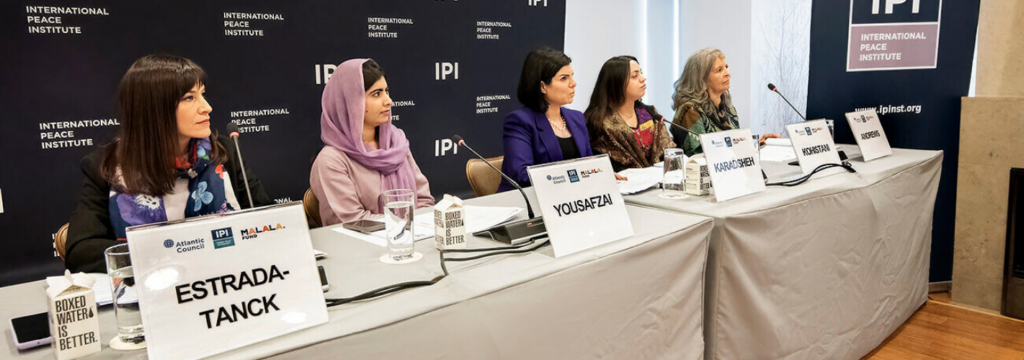
Briefings in New York City and Washington, DC
In January, the SLP hosted a series of briefings on the gender apartheid codification effort in New York City and Washington, DC, during which the SLP’s Senior Legal and Policy Advisor Alyssa Yamamoto and Strategic Legal Advisor for Gender Justice Akila Radhakrishnan were joined by a panel of experts including the SLP Senior Legal Advisor Sareta Ashraph, Penelope Andrews, Christina Hioureas, SLP Gender and Policy Advisor Metra Mehran, and Paloma van Groll. In Washington, the group met with representatives of several think tanks, US government bodies, and EU embassies. In New York, the delegation hosted closed regional briefings for Latin American and Caribbean countries and EU and other Western countries.
Advocacy in Latin America
Earlier this month, Gissou Nia, along with Akila Radhakrishnan and SLP Nonresident Senior Fellow Nizar El Fakih, traveled to country capitals in Latin America to discuss human rights, gender justice, and other issues impacting Iran and Afghanistan. The group met with high-level representatives of the governments of Chile, Argentina, Brazil, and Colombia to urge their support for both codifying gender apartheid in the UN Sixth Committee’s draft crimes against humanity treaty and extending the mandate of the UN Fact-Finding Mission on Iran by voting in favor of an upcoming UN Human Rights Council resolution.
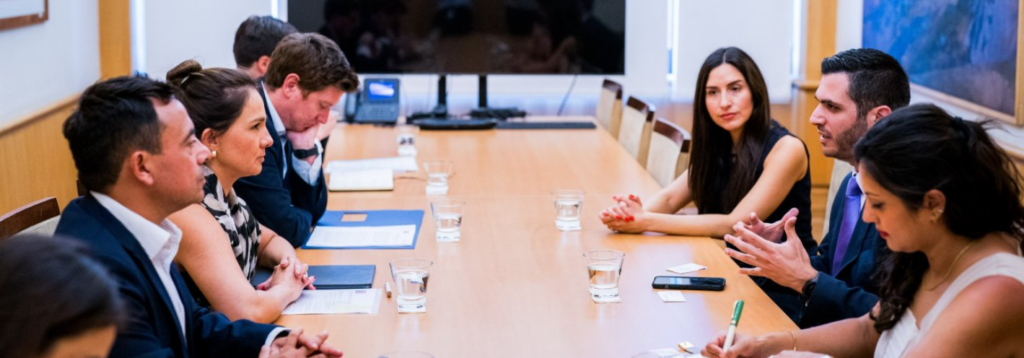
Chile’s Ministry of Foreign Affairs produced a press release about the group’s meeting with Undersecretary of Foreign Affairs Gloria de la Fuente, which you can read here.
LAUNCH OF THE IRANIAN ARCHIVE
Following the release of the UN Fact-Finding Mission on the Islamic Republic of Iran’s report to the UN Human Rights Council finding crimes against humanity, including for gender persecution committed over the course of the protests following the death of Mahsa Jina Amini, the SLP and Mnemonic in partnership with a coalition of international organizations announced the launch of the Iranian Archive. The archive preserved over one million vulnerable digital artifacts recording serious human rights violations committed by the Islamic Republic of Iran against Woman, Life, Freedom movement protestors.
The Iranian Archive is intended to support future investigations and accountability proceedings. The SLP and Mnemonic are partnered with The Promise Institute for Human Rights at UCLA Law, UC Berkeley’s Human Rights Center, Amnesty International‘s Digital Verification Corps, the Iran Human Rights Documentation Center, and the Azadi Archive.
UYGHUR ADVOCACY IN GENEVA
In January, SLP Nonresident Senior Fellow and Uyghur human rights lawyer Rayhan Asat traveled to Geneva to attend the interactive dialogue for China’s 2024 Universal Periodic Review (UPR), a process through which the UN Human Rights Council assesses the human rights records of all UN member states according to a rotating schedule of cycles.
Since the UPR takes place only every five years, its interactive dialogue presents a significant opportunity for member states to make specific and measurable recommendations to China in light of the ongoing repression of the Uyghur community and the Chinese government’s disregard for previous critiques of its human rights record. In July, Asat submitted a comprehensive report to the UPR Working Group on the human rights situation in Xinjiang, followed by a New Atlanticist piece about the contents of the report and the need for member states and US officials to hold China accountable for its abuses.
While in Geneva, Asat met with representatives of twenty-two member states to encourage their participation in the interactive dialogue. In the meetings, she presented them with a briefing paper outlining China’s violations against the Uyghurs, the findings of relevant UN human rights bodies, and suggested recommendations to be made to China during its review. Ultimately, more than twenty member states took a strong stance against China’s human rights record during the session.
EUROPEAN COURTS REPORT
In February, the SLP published its latest report, “The far reach of justice: Holding the Islamic Republic of Iran Accountable in European courts.” The report explores the options available to hold the Islamic Republic of Iran accountable through the national judicial systems of seven European states by using their universal jurisdiction frameworks.
Throughout Europe, states have adopted universal jurisdiction provisions, which allow them to prosecute acts that constitute core international crimes—genocide, war crimes, and crimes against humanity—even if the crime was committed in a different state by and against foreign nationals. The countries covered in the report—Belgium, England and Wales, France, Germany, the Netherlands, Sweden, and Switzerland—were selected due to several factors, including the strength of their universal jurisdiction frameworks and frequency of use; their robust caselaw and policies for prosecuting atrocity crimes committed extraterritorially; the size of Iranian expatriate communities in these countries, especially those fleeing persecution and violence; and the possibility of travel by Iranian officials to these jurisdictions.
This report details what each country’s universal jurisdiction provisions entail, how proceedings are initiated, and what victims’ rights are protected. It also gives an overview of each state’s relevant jurisprudence to date, analyzing the legal, practical, and political viability of future cases involving Islamic Republic of Iran violations, including in light of the country’s diplomatic relationship with Iran. Finally, it provides regional and country-specific recommendations to facilitate more cases against Islamic Republic of Iran perpetrators and to strengthen universal jurisdiction frameworks more broadly.
WOMEN IN JUSTICE AND ACCOUNTABILITY IN MENA
On February 14, the SLP hosted a hybrid event about the crucial role women and their testimonies play in pursuit of justice and accountability in the Middle East and North Africa (MENA). The panel featured Dalal Mawad, award-winning Lebanese journalist and author of All She Lost: The Explosion in Lebanon, the Collapse of a Nation and the Women Who Survive; Mai El-Sadany, executive director of the Tahrir Institute for Middle East Policy; and Haydee Dijkstal, an international human rights lawyer and SLP nonresident senior fellow.
The discussion was moderated by Patricia Karam, a nonresident senior fellow at Arab Center Washington DC, and touched on a variety of issues, including possible responses to gender-based and sexual violence, the role of independent media in accountability efforts, and legal mechanisms protecting the rights of women and girls.
NEW TEAM MEMBERS
STAY UPDATED
Follow us on social media and support our work
Subscribe to our newsletter for quarterly updates on the SLP’s work on prevention and accountability efforts for atrocity crimes, human rights violations, and terrorism and corruption offenses around the world.
Image: Residents inspect the rubble of damaged buildings, looking for victims, after a deadly airstrike, said to be in Maarat al-Numan, Idlib province, Syria August 28, 2019. Picture taken August 28, 2019. Syria Civil Defence in the Governorate of Idlib/Handout via REUTERS
